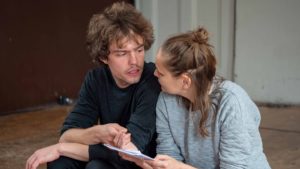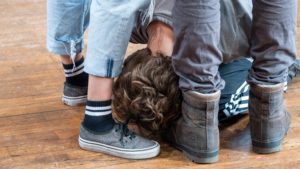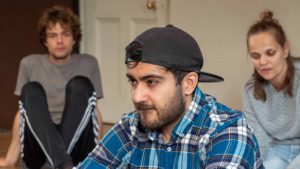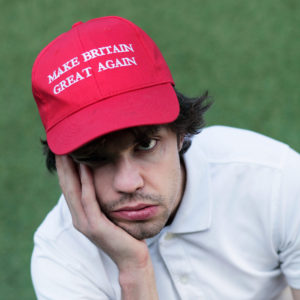Florence Bell is a writer, director and performer whose credits include TV dramas Wolf Hall, The End of the F*cking World and Clink. In 2015 she co-founded new writing initiative Brave New Word which has to date showcased over one hundred pieces of new writing. The Open is the debut production from her fledgling company FIASCO, a multidisciplinary production house dedicated to reflecting the dark and absurd times we live in.

What inspired you to produce a show of this calibre?
“The play was inspired by the events of 2016; the result of the EU referendum in the UK and Donald Trump’s presidency in the US. That year felt like it rocked the world, and those two events certainly made everything feel like there were suddenly no rules for how things were ‘supposed’ to go. The idea of the Great British Golf Course came out of imagining the worst case scenario caused by those events: that adrift from the EU the UK would be at the mercy of right wing governments eager to sell off our assets to the US in trade deals. Trump’s eyeing up of the NHS recently has proved to be evidence of this. The Great British Golf Course is a satire of this outcome – that the whole of the UK would be sold and turned into a golf course. It’s kind of nightmarish and kind of not far from the truth. “
How has the production process been thus far? What have been some of the most memorable moments?
“Without a doubt one of my most memorable and treasured moments has to be hearing the play with this cast for the first time. It just really came alive and became it’s own entity, rather than this slightly mad idea rattling around in my head for three years. Another truly memorable moment was waking up about three weeks into the production period and hearing the news that Trump had tried to buy Greenland. That was really surreal. It was like the play was coming true, just in time for us staging it.”

Why was a golf course chosen to invoke the “feelings of fear and isolation” as your twitter states?
“So no offence to golfers, but golf is weird to me. In writing and rehearsing the play I’ve realised there’s more to it than I thought – the transition of the land from public to private, the degradation of the environment; it’s all epitomised in golf! When you see golfers playing golf they’re in nature, but it’s this totally clipped version of nature tamed to their needs. The optics of largely white, male, elite golfers strutting around chatting about business is pretty powerful I think, cause at the end of the day it’s exactly that demographic of people who are wrecking the environment with unregulated capitalism.
The idea of the whole UK as a golf course is therefore quite scary and isolating. Outside of the EU (and I know the EU is not perfect) we’re no longer tied into the environmental and employment protections we’ve been enjoying.”
As it seems an outsider changes things for the worst (Donald Trump), but then an “immigrant rebel” comes in to shakes things up. Why is there a potential dynamic shift?
“I find the characterisation of Trump as a maverick rebel hard to swallow to be honest. Yes he’s a political outsider but only in the sense that he doesn’t play by any rules of decency. The Open portrays Great Britain after 30 years of intense political turmoil, a radically changed landscape where the characters that call themselves British have forgotten what it means to be British at all. I don’t know whether there is such a thing, but if I can associate it with anything it’s tolerance, decency and courage. It takes Jana, an immigrant who returns at risk of her life, to remind Arthur and Patrick who they were, what Great Britain was, what it meant.
So in a sense the play is about returning to a previous state rather than overthrowing the present in search of something new. It’s about remembering as an act of rebellion, because their memories and sense of identity has been taken away.”

How do the show’s themes of politics, such as national identity and human rights, tie into the endurance of love?
“That’s a good question. Love is only politicised in a way that makes it sound cheesy as hell, (see hippies and ‘Choose Love’ t shirts) but it’s actually pretty powerful and shouldn’t be underestimated. I don’t think it’s as simple as ‘Choose Love’. It’s harder to love, it’s a more sophisticated human response than fear or hate.
At the start of the play Patrick – the depressed romantic who’s been separated from the love of his life because she’s from a different country seems mad for believing in love above all else. His plight seems impossible. The play is about how the politics of national identity and human rights bring us to that point, and how love (not just romantic love) can be very powerful in the face of all that. “
What advice should the audience keep in mind as to why this play is being produced now?
“There’s a quote my mum told me, I think it’s Jerzy Grotowski, about the audience being witnesses. I really like that. I want the audience to be entertained but I also want them to leave feeling like they’ve witnessed something, they’ve been let into a secret. At different times in the play the audience is cast in different roles (not literally, but in a subtle way). They’re the prisoners, they’re the rest of the world. I want them to leave the theatre feeling like they can do something about what’s going on, that they’re powerful. Cause I think we spend a lot of time feeling like we’re not.”

The Open
Running from September 24th-October 12th
BOOK HERE



